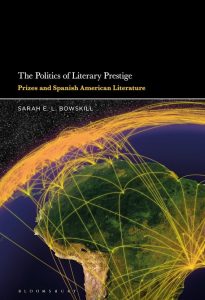This post is part of our Research Initiation Scheme for 2021-2022.
On Friday 11th February, Dr Sarah Bowskill (Senior Lecturer in Latin American Studies, QUB) delivered a seminar entitled ‘Prizes for Spanish American Literature and the Changing Role of the Author in Society’ at the 2021-2022 Modern Languages Core Disciplinary Research Group Seminar Series. Dr Bowskill’s talk explored the link between power and literary prestige, focusing particularly on how politics underpins Spanish American literary prizes and award ceremonies, and the role of the author in society.

The talk commenced with an overview of the intertwining of literature and politics in Latin America. Dr Bowskill drew on the work of Doris Sommer to explain that in the nineteenth century, post-independence Latin American nations were built by author statesmen, such as Domingo Faustino Sarmiento and Bartolomé Mitre. Writing formed an important part of their political work, and the texts written by these author statesmen were taught in schools, and intended to inspire love for the nation. By the early twentieth century, national prizes for literature were used by the state to further connect literary and political fields. Dr Bowskill highlighted the motivation behind introducing such prizes, since Latin American countries looked to prizes for science and literature as a way to establish international status and national pride.
State-sponsored national prizes, as Dr Bowskill went on to discuss, can thus be seen to use the reputations and voices of authors to endorse the political agenda of the awarding body in exchange for financial reward and a public platform. Highlighting authors’ awareness of the significance of these interactions, she reflected on how Spanish American authors have frequently introduced political themes into literary events. One example is the Chilean writer Pablo Neruda, who won the Nobel Prize for Literature in 1971. In his speech, Neruda referred to his experience of dictatorship and exile. Spanish American authors not only have license to publicly discuss politics in their award speeches, but as Dr Bowskill pointed out, they are in some ways expected to do so, since they are seen as spokespeople and representatives.
Turning her attention to the position of identity politics in literary prizes, Dr Bowskill then focused on prizes restricted to authors based on gender or ethnicity. Considering how female Spanish American authors have been neglected in the awarding of literary prizes, Dr Bowskill noted how gender can be an obstacle to literary prestige, although not necessarily to commercial success. The role of women in the public sphere is thus limited, as women have often been prevented from embodying the role of public intellectual and representative at literary events. Identity politics may be at play in particular prizes for women authors in Mexico (such as the Premio Sor Juana Inés de la Cruz), and for literature in indigenous languages (such as the Nezahualcóyotl Prize for Indigenous Literature). These prizes seek to address inequalities and bring recognition to the work of marginalized groups. Once again, authors act as representatives of their gender or ethnicity.
Going on to consider publisher-run prizes from the mid-twentieth century onwards, Dr Bowskill emphasised that while these prizes may be seen to be liberating the author, giving them independence from the state, they are not free from politics. Rather, the priority of publisher-run prizes is profit, maximised by publicity. As such, the politics of literary prestige are associated with celebrity. However, Dr Bowskill noted that the author’s credibility as a public intellectual may be damaged by an overemphasis on celebrity.
Towards the end of the talk, Dr Bowskill guided us to reflect on our role as critics in light of literary prizes and the role of the Spanish American author in society. She reminded us that we should be alert to the politics that undergird literary prizes and recognise that all prizes come with a politicised form of prestige that can be costly to society as a whole. Dr Bowskill also questioned whether prizes really contribute to societal progress if they are only awarded on the basis of gender and/or ethnicity. The talk concluded by pointing to literary prizes as an indicator of the role of the author in society and the prevailing political agenda.
I found Dr Bowskill’s presentation to be thought-provoking, and it provided a great insight into the relationship between cultural production and politics. In a society so fascinated with the status of celebrity, arguably heightened by the use of social media, this seminar has encouraged me to consider the role of the author in wider society and look deeper into the politics that may be at play in the context of literary awards.
Report by Sarah Henry, final-year undergraduate in French and Spanish
Editor’s note: Sarah Bowskill’s new monograph, The Politics of Literary Prestige: Prizes and Spanish American Literature was published by Bloomsbury in May 2022.